What are you willing to fight for? What are you willing to die for? Watch @virungamovie and join the fight! #Virunga: image via TheBasementBalcony @basementbalcony, 6 January 2015
I trained as an anthropologist even though from an
early age I was interested in animals. It’s counter-intuitive, but I
grew up at a time of a great poaching crisis in Kenya when the country
lost half of its elephants. All the fundamental problems involved human
behaviour. So I realised it was more valuable to study humans. The
wildlife can look after itself –- humans have to be managed.
Our family holds title as Princes of Belgium, but I
am not a member of the royal family -– we’re not Saxe-Coburgs. I was born
in Carthage and my parents moved to Kenya when I was three months old.
My wife is Kenyan, my children are Kenyan, but I feel Belgian. It’s a
stew.
Purists say you shouldn’t compare great apes to humans,
but when you are among them, you can’t help it. Gorillas take on all
the positive aspects of being human: the affection, family values, their
stability in groups.
We don’t have the exact numbers of rangers who have
been killed [by militias and other armed groups]. In the mid-90s they
were getting killed and it was not documented. We do know 140 have been
killed since the war in 1996. This is the park that has paid the
greatest price for its protection.
I have spent 20 years thinking about bravery, about
why the rangers keep working under such conditions. For some it is
because there aren’t that many options, because it is a good job. For
others it is because their parents and grandparents were rangers. For
others still it is the unfashionable concept of loyalty -– it is their
duty to protect the park.
I had no profound moment when I was shot [by
still-unidentified assailants] –- I was living second to second -– but I
was profoundly moved by the people who stopped to help me. Two very poor
Congolese farmers on a motorbike threw the large sacks of vegetables
they were taking to market on to the ground, picked me up and got me out
of that place. People drove past who didn’t stop, but these two didn’t
panic.
I met my wife [palaeontologist Louise Leakey] a long time ago. She
is my main source of advice. She was practically born in the field and
has spent many years in conservation in northern Kenya.
Although there are immediate problems about survival in a war, you
also have to think about the future. You cannot allow the future to be
destroyed. The mountain gorillas represent enormous potential for the
development of communities. Rwanda, which had many of the same problems,
earns $430m from tourism. It takes decades for wildlife populations to
recover, but they can be destroyed in days. You have to protect wildlife
even if there is a war going on. Protecting wildlife is not a luxury.
I lose my temper all the time, but I try to manage
it so nobody notices. You do irreparable damage to the people facing you
when you raise your voice. It’s a sign of disrespect.
I am not anti-mining and oil. We all benefit. But
Soco [a British petroleum company which has been prospecting in Virunga]
has put itself in a difficult situation. It’s undertaking activities in
an area where there is serious armed conflict that’s now recognised as
having at its root the exploitation of natural resources.
I
have everything I could possibly want around me. The only thing missing
is my family. Apart from that I could live here for ever.
Emmanuel de Merode: This Much I Know: 'Gorillas take on all the positive aspects of being human': The director of the Virunga National Park, Congo, 44, on being shot by assailants, losing his temper, and the bravery of rangers: The Guardian, 4 October 2014
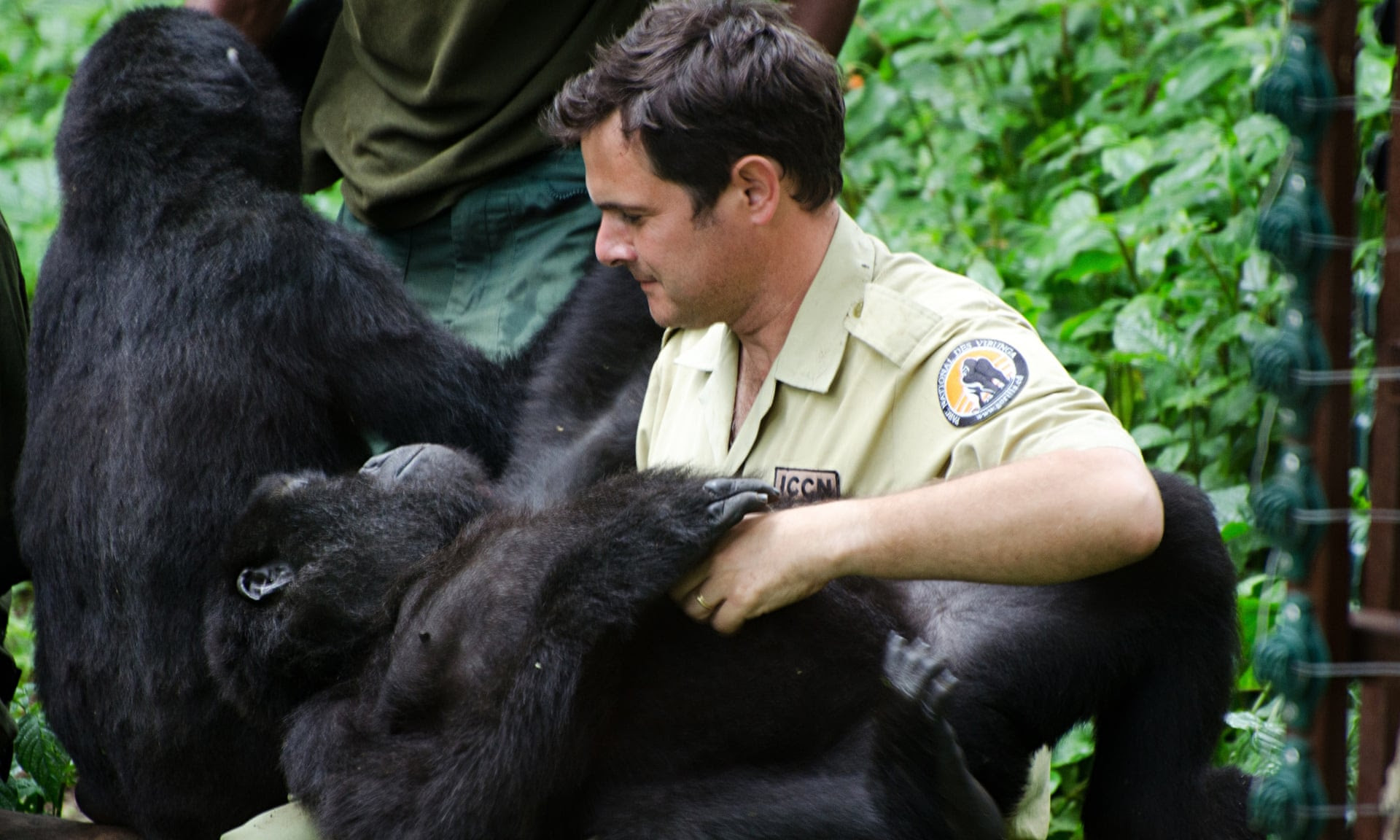
Emmanuel de Merode: ‘You cannot allow the future to be destroyed.’: photo by Luanne Cadd via The Guardian, 4 October 2014

The Vitshumbi fishing village on the southern shores of Lake Edward is in the 'Block V' area of Virunga national park. Soco International wants to explore for oil underneath the park, which is Africa's oldest and a world heritage sites: photo by Brent Stirton/WWF-Canon via the Guardian, 19 June 2014

A view from the fishing village of Kavanyongi on the northern shores of Lake Edward, in Virunga national park. The park is the size of a small country, straddling the equator in the Democratic Republic of the Congo: photo by Brent Stirton//WWF-Canon via the Guardian, 12 December 2013
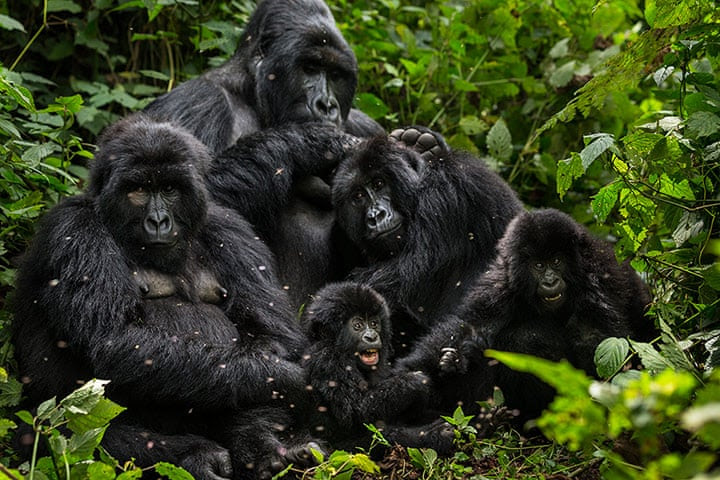
The Bageni gorilla family.
Virunga is home to one-quarter of the world’s critically endangered
mountain gorillas, which have been a source of tourism revenue in
peaceful times: photo by Brent Stirton//WWF-Canon via the Guardian, 12 December 2013

Jungle surrounding Mikeno Lodge, an upscale lodge located in the park. Virunga's rainforests, volcanoes and rare and beautiful wildlife are attracting increasing numbers of tourists: photo by Brent Stirton//WWF-Canon via the Guardian, 12 December 2013

The park boasts a wide range of wildlife including African icons like lions, elephants, hippos, chimps and the okapi: photo by Brent Stirton//WWF-Canon via the Guardian, 12 December 2013
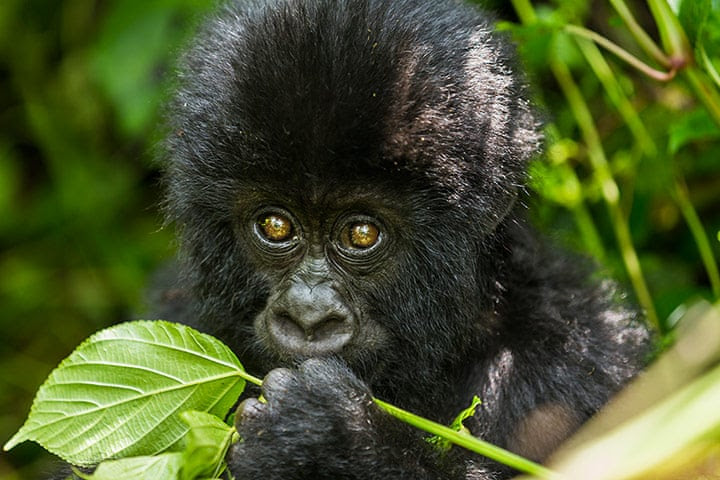
A member of the Bageni gorilla family. Soco’s plans to explore for oil are not the only threat to Virunga -- civil unrest and wars have put pressure on local people, wildlife and resources for many years: photo by Brent Stirton//WWF-Canon via the Guardian, 12 December 2013
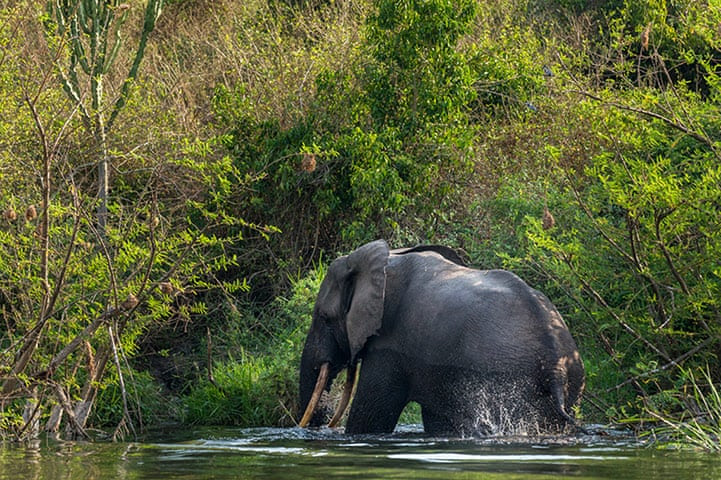
A bull elephant bathing and drinking water in Ishango on the northern shores of Lake Edward: photo by Brent Stirton//WWF-Canon via the Guardian, 12 December 2013

Virunga is home to huge numbers of unique birds: photo by Brent Stirton/WWF-Canon via the Guardian, 12 December 2013

Lake Edward, in Virunga’s internationally important wetlands, is crucial for local livelihoods and food: photo by Brent Stirton//WWF-Canon via the Guardian, 12 December 2013

Villagers tend to their nets in the fishing village of Kavanyongi. According to WWF, oil operations could lead to the loss of fishing jobs or revenue to an industry that employs 27,000 people in the developing country: photo by Brent Stirton//WWF-Canon via the Guardian, 12 December 2013

A villager looking at fish in Vitshumbi fishing village on the southern shores of Lake Edward: photo by Brent Stirton//WWF-Canon via the Guardian, 12 December 2013

Villagers collecting water in Vitshumbi fishing village on the southern shores of Lake Edward. From road-building, pipeline-laying, and of course the potential oil spills and pollution of land and water, WWF says the oil development could have serious negative impacts on wildlife, habitats and people: photo by Brent Stirton//WWF-Canon via the Guardian, 12 December 2013
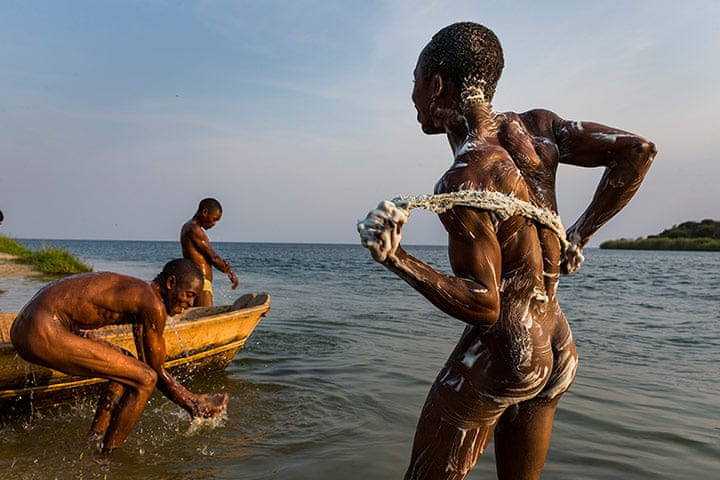
Men bathing in the Semliki River as it flows into Lake Edward, Ishango. There are 30 possible impacts on Virunga’s people, plants, animals, air and water, conservationists say. Environmental risks to Africa’s most biodiverse park include habitat loss, invasive species, poaching and pollution: photo by Brent Stirton//WWF-Canon via the Guardian, 12 December 2013
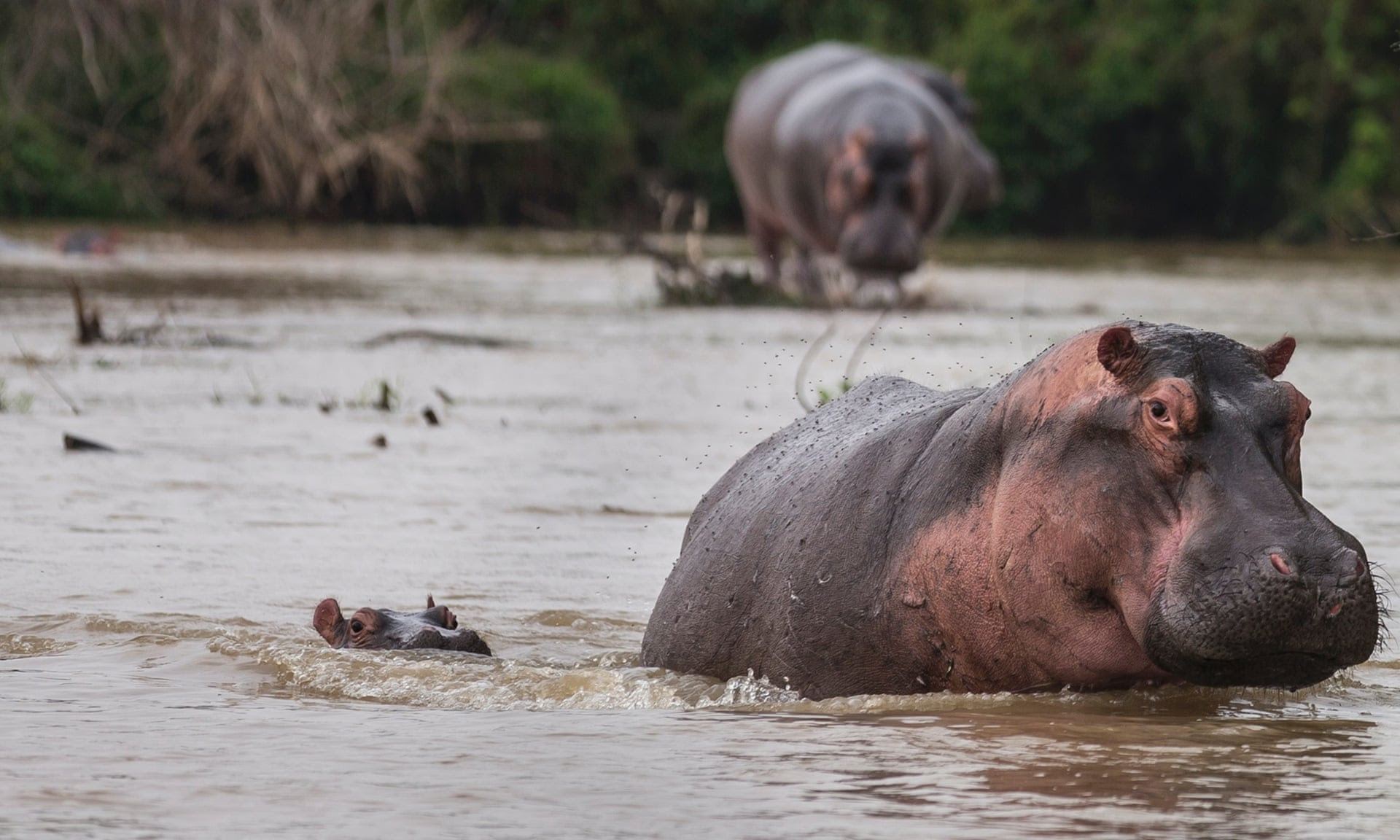
Recovering hippo populations close to the ICCN Ranger station in Lulimibi, Lake Edward. It once housed the largest hippo population in the world, but the numbers have declined drastically since 1994: photo by Brent Stirton//WWF-Canon via the Guardian, 19 June 2014
Virunga: Take action #Virunga #VirungaMovie: image via Mikael Strandberg @Explorerglobal, 4 January 2015
Director of #Virunga talks war, gorillas and hazards of doc filmmaking: image via SundanceNOW @docclub, 6 January 2015
#Virunga NP On average,1 ranger dies every month due to rebels or poachers. If you can support FALLEN #RANGERS FUND TY: image by calfune @calfune, 30 December 2015

What is happening in #Virunga is an urgent story that every one of us should know about: image via Virunga Movie @virungamovie, 16 December 2015
Screw you #poachers. We're still alive and doing well. Thanks to @gorilllacd #DRC #virungamovie #Virunga: image via Stephanie Perrazzone @sperazzone, 16 December 2015
Read about #Virunga's mountain #gorillacd and learn about the park's threatened existence #Virunga: image via Stephanie Perrazzone @sperazzone, 16 December 2015
#Silver back gorilla in #Virunga watch #virungamovie: image via Stephanie Perrazzone @sperazzone, 7 December 2015
MT @MikenoLodge Volcanoes lighting the skyline in #Virunga: image via Virunga National Park @gorillacd, 1 December 2014
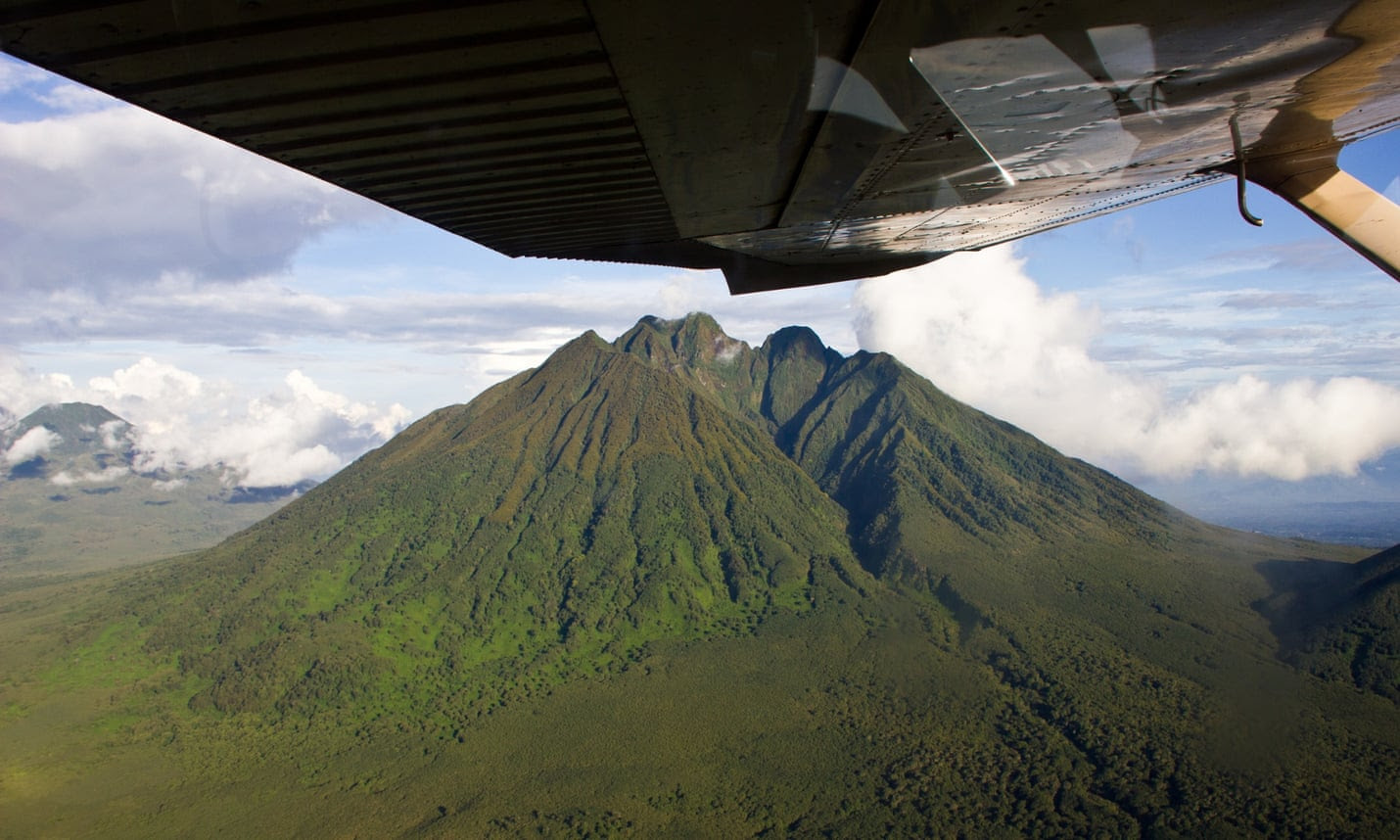
Aerial view of the volcanoes in Congo's Virunga national park: photo by Cai Tjeenk Willink via The Guardian, 29 November 2014
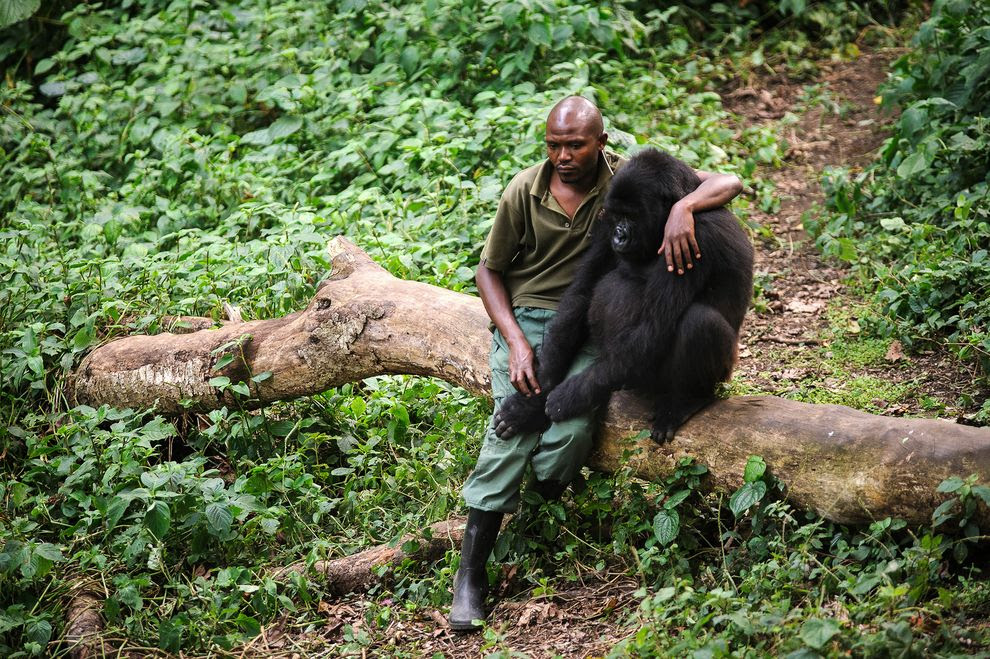


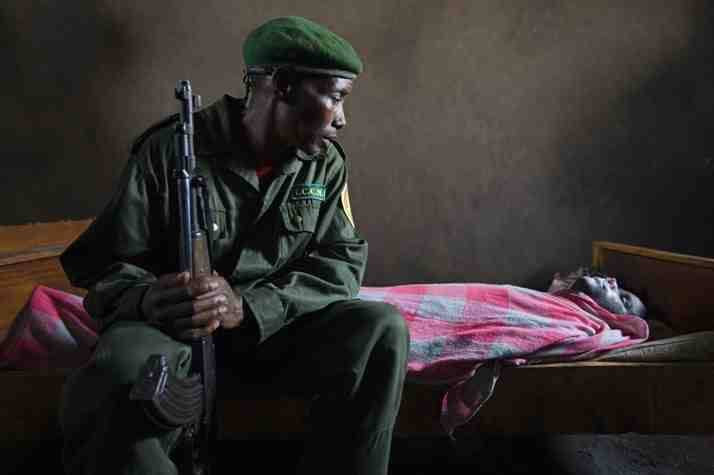
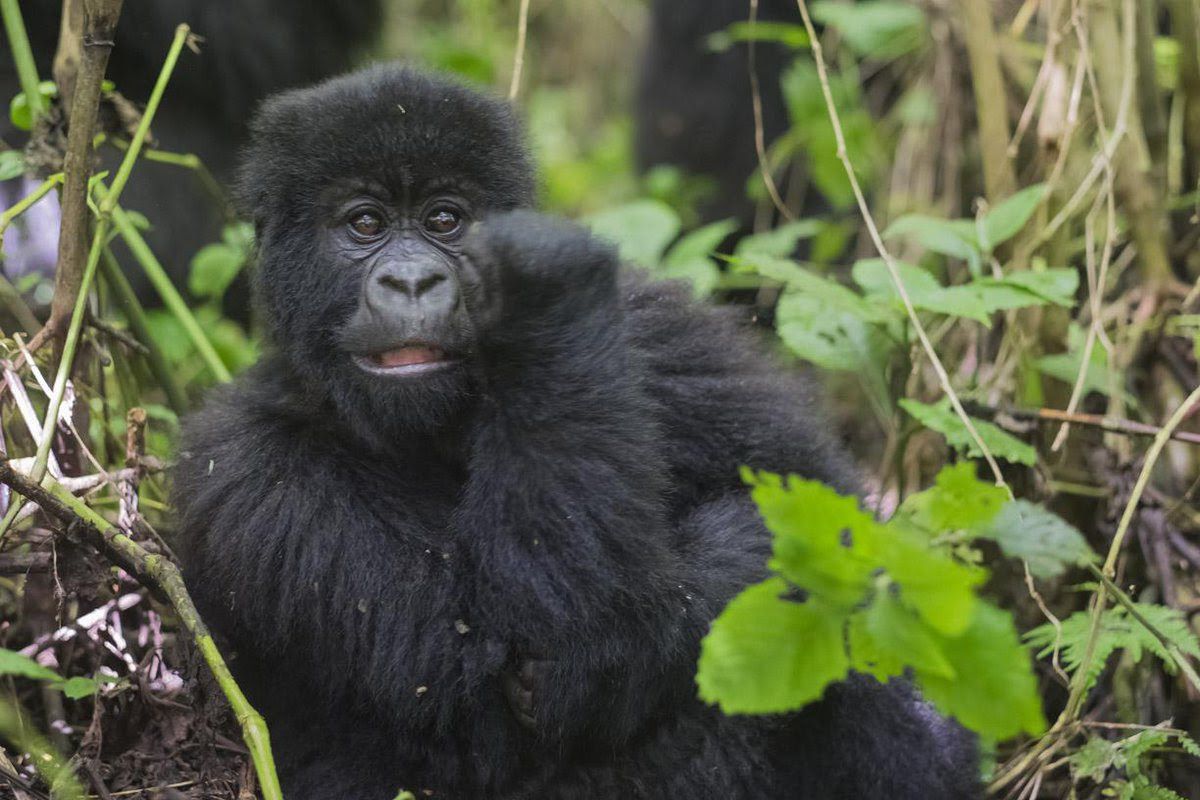



Virunga (2014): trailer
ReplyDeleteLe Réveil des Virunga (2014)
TEDxWWF: Emmanuel de Merode: A Story of Conflict, Renewal and Hope (2011)
We Will Not Go: J. Ralph, featuring Salif Keita, Youssou NDour and Fally Ipupa (from Virunga soundtrack)
Beautiful post! So moving.
ReplyDeleteThanks very much, Nin.
ReplyDeleteThe movie is a real heartbreaker.
we're(potentially) both the virus and the cure. (ah, but if we were to be removed, the cure would happen on its own.)
ReplyDeletelistened to a radio program yesterday that you might enjoy, enemies and angels. oh, the complexities of being man.
http://www.cbc.ca/ideas/episodes/2014/12/23/enemies-and-angels/
hit listen under the photo of them together. if you listen to anything, listen to the whole program first, before the video, which introduces a new step in a new project. (somehow radio, without images, is more truth telling than video. we cleave to too much sentimentality through images. the radio program tries to, but the truth is, i feel, better maintained, recognized through the ploys.)
xo
erin
Thanks, another terrific post...
ReplyDeleteIt's imperative that we do compare ourselves to our ape cousins.
ReplyDeleteThank you, Tom
Many thanks, friends.
ReplyDeleteThe complexities are at once intensified and gentled by the animal memories we must carry deep inside.
In any case the old folks here watched this film separately and later had to admit to each other in a bit of embarrassment that they'd each wept their separate ways through it.